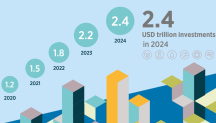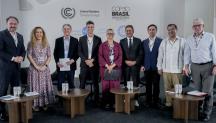

Implementing Regulations Can Turn Honduras’ Renewables Ambition into Reality
Newsletter
New report finds translating enabling policies into coherent implementation mechanism will attract more investments in renewables, reducing dependency on fossil fuels.
Tegucigalpa, Honduras, 14 November 2023 – With abundant renewable energy potential and ambitious target to achieve 80 per cent of renewables share in the power generation by 2038, Honduras is already on the right path to reduce its reliance on fossil fuels. The Renewables Readiness Assessment: Honduras by the International Renewable Energy Agency (IRENA) identifies the need to have current energy laws enforced with regulations and implementation mechanism to accelerate the country’s energy transition.
As one of the countries most vulnerable to climate change consequences in Latin America, Honduras faces the urgent need to reduce its CO2 emissions with increased use of renewables. Until recently, hydropower generation has been contributing the largest share to the renewable energy mix, but production faces more challenges due to alterations in climatic patterns. Honduras’ economy is also at risk as it relies on forestry, agriculture and fishing industries – all susceptible to adverse climate-related events.
Aimed at supporting the current government’s priority as laid out in the Energy Roadmap 2050 and National Plan 2010-2022, the report was developed in collaboration with the Honduran Energy Secretariat and the General Directorate of Renewable Energy and Energy Efficiency. It highlights the role of renewable energy in reducing dependency on fossil fuels, enhancing access and efficiency, and promoting sustainable development.
IRENA Director-General, Francesco La Camera says, “Honduras has abundant natural resource reserves to achieve climate resilience and sustainable development. It has also shown ambitious commitment in renewable energy development. This Assessment identifies the gap between ambition and implementation, and makes recommendations to ensure that a successful transition benefits all in the communities.”
“We express our special thanks to IRENA and all the actors who have actively participated in the elaboration of this Assessment, which will undoubtedly serve as a reference to achieve the deployment of renewable energy in Honduras. We reaffirm the commitments of the Energy Secretariat – the governing body of the country’s energy sector responsible for creating policies for the adequate exploitation of natural resources and the generation of renewable energy in harmony with the environment,” says Erick Tejada Carbajal, PhD, Honduras’ Secretary of State in the Energy Office.
Launched in Tegucigalpa, Honduras, in front of government officials and regional partners, the Assessment recommends a set of actions to address the challenges in these 6 key areas:
- The role of energy sector institutions and governance strengthening
- Energy policy and regulatory framework for the renewable energy sector
- Sustainable development and energy efficiency
- Electricity industry strengthening
- Investment in renewable energy technologies and infrastructure
- Institutional and human capacities
There are still challenges to bring access in Honduras’ remote areas and improve quality of services at affordable costs. Regulations that aim to attract increased investments in the deployment of variable renewable energy can improve energy access and meet the electricity needs.
The report finds that Honduras has high-quality solar potential for electricity production. The country has also large untapped biomass resources in the form of cane bagasse and palm oil waste. Comprehensive renewables projects could offer benefits to local communities, and add installed capacity in the electricity sector.
Read the Renewables Readiness Assessment: Honduras here.




